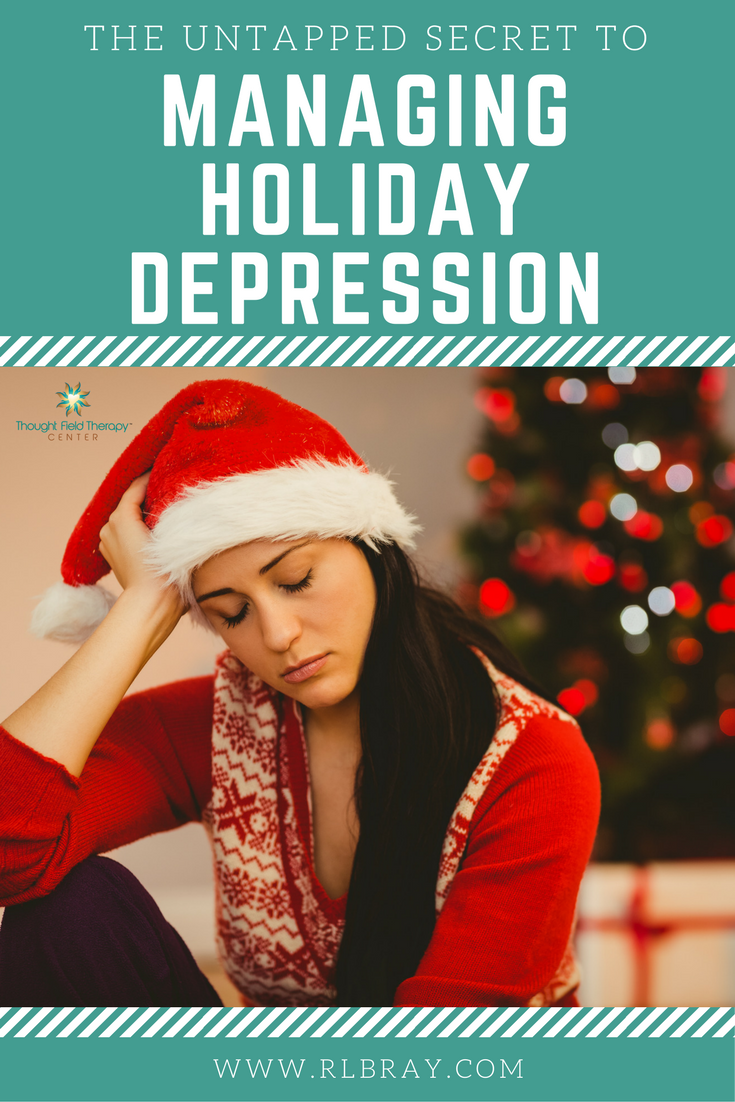The holidays are here and for some people, that means decorations, parties, shopping for gifts, and tons of holiday cheer. It’s supposed to be the happiest time of year, right? Unfortunately, this isn’t the case for people who struggle with holiday depression.
For many people, the holiday season is more about stress, frustration, anxiety, and depression than anything else. If you are one of those people, I first want to say, I’m sorry. I know this time of year can be overwhelming.

I want to help you. Today, I’m going to share tips that will help you manage depression in hopes that you’ll actually be able to enjoy at least some aspects of the holiday season this year.
Find Relief From Holiday Depression
Need immediate relief? Jump down to the bottom of this blog and watch the video I posted.
As I’m sure you know by now, depression is certainly not limited to the holiday season. In fact, Major Depressive Disorder affects more than 16.1 million American adults and is the leading cause of disability in the U.S. for ages 15 to 44.3.
Symptoms can vary from mild to severe and can include:
- Feeling sad or having a depressed mood
- Loss of interest or pleasure in activities once enjoyed
- Changes in appetite — weight loss or gain unrelated to dieting
- Trouble sleeping or sleeping too much
- Loss of energy or increased fatigue
- Increase in purposeless physical activity (e.g., hand-wringing or pacing) or slowed movements and speech (actions observable by others)
- Feeling worthless or guilty
- Difficulty thinking, concentrating or making decisions
- Thoughts of death or suicide
Symptoms must last at least two weeks in order for an official diagnosis of depression to be made. According to the American Psychiatric Association, one in 15 adults is affected by depression every year, and one in six people will experience depression at some point in their life.
According to the National Institute of Health, people experience an exceptionally high incidence of depression during the holiday season.
There are many possible explanations for this, including:
- Social isolation. For people who have a small social circle or very few opportunities for socialization, the holidays can be a harsh reminder of how disconnected they are, and can cause them to withdraw even more, triggering holiday depression.
- Grief. The holidays can make people more aware of the loss of a loved one. It’s important to note that grief and depression aren’t the same thing; however, the loss of a loved one has the potential to send some people into a severe depression, which can be triggered or worsened by the holiday season.
- Anxiety about family interaction. For people whose family dynamic is less than ideal, the holiday season can trigger a lot of anxiety. If your dad and brother fight every year, ruining the day for the whole family, it can cause you to expect the worst, leading to an even deeper sense of dread and overwhelm surrounding this time of year.
- Too many events. Between shopping for gifts, planning big family meals, parties, decorations, travel plans and/or visiting family, and everything else that comes with this holiday season… it’s overwhelming, at best. For many people, busyness is a trigger for depression, making the logistics of the holiday season simply too much to manage.
The good news? Holiday depression is treatable. There are many methods available to help people manage depression. The most common is medication. For many people, antidepressants work, and for some they work extremely well. However, for others, they either don’t work, or the side-effects are so severe that they don’t want to take them. Some of the side-effects of common antidepressants include:
- Nausea
- Increased appetite and weight gain
- Loss of sexual desire and other sexual problems
- Fatigue and drowsiness
- Insomnia
- Blurred vision
- Constipation
- Dizziness
- Irritability
- Anxiety
If you are looking for other methods to manage holiday depression, you’re in the right place. More than two decades ago I discovered a drug-free, pain-free, and side-effect free technique for relieving symptoms associated with depression. It’s helped thousands of people over the years and now it can help you.
If you’re not familiar with tapping, this may seem a little strange at first. I realize it’s a little unconventional. But here’s the thing though: it works! In fact, it’s what mental health experts refer to as “evidence-based treatment.”
If there’s a evidence-based way to make yourself feel better without drugs, pain or other side effects, isn’t it worth trying? Follow along with me in this video and let’s see what it can do for you:
Contact me now to get more help and to learn more about how to manage holiday depression naturally so you can open yourself up to all the joy life has to offer throughout this season and beyond.

